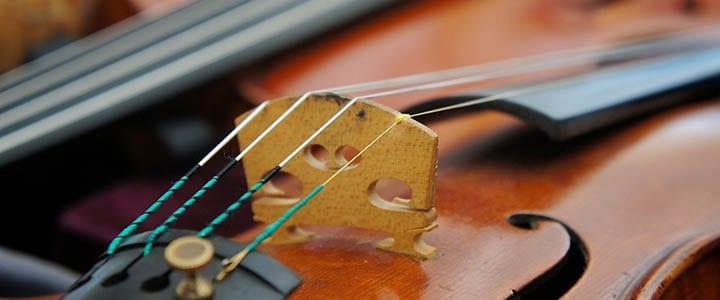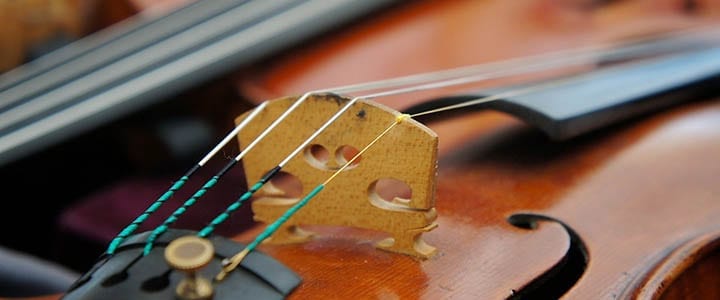Deciding whether to buy a new or used violin can be difficult. You want a quality instrument that’s going to last, but you don’t want to spend a fortune. So what do you do? Below, violin teacher Julie P. gives her two cents on what to consider when purchasing a used violin…
If you’re in the market for a violin, you may be wondering whether buying a used one is a good or bad idea. This is not an easy question to answer, as there are a lot of things to consider.
On the one hand, you can get more for your money when buying used violins. However, there is a real risk, as you could purchase an instrument that needs more repairs than you originally thought. Before you decide to purchase a used violin, ask yourself the following four questions.
1. Is it in Good Working Condition?
Assessing the condition of used violins is the toughest part. Beginner violins need less attention than intermediate or advanced instruments, but they still need to be in excellent working order. When learning violin, the last thing you need is to be fighting an instrument in poor condition.
Most used violins sold at music stores have been professionally checked and set up by a repair technician. Nonetheless, you want to make sure to ask the store manager before purchasing.
An ideal beginner or intermediate violin will have a bridge and strings that are no more than a year or two old. What’s more, the instrument should have sealed seams, pegs that don’t slip or get stuck, and no cracks. If an instrument needs repairs for any of these items, the purchase price should reflect that.
If you’re buying an instrument from a private party (for example, eBay or Craigslist), there is much more risk involved. Besides playing the instrument to see if you like the way it sounds, here are a number of other things to look for.
- Is the bridge standing straight up, or is it warped?
- Does it have a full set of strings?
- Does the body have any cracks?
- Are the seams fully sealed, or are they opening up?
- Do the pegs move easily?
2. What’s the History?
When considering buying a used violin, its helpful to ask about the instrument’s history. Has it been played recently, or was it sitting in a closet for five years prior to being put on sale? Oftentimes, instruments that have been collecting dust for some time will require more attention and repairs, which means more money out of your pocket. Ask the store manager or independent seller the history of the instrument, including any past troubles he or she might have had with certain parts.
3. Does it Come with Accessories?
Chances are if you’re looking to purchase a violin, you’re also looking to buy accessories to go along with it such as a case, bow, rosin, and shoulder rest. Advanced instruments are commonly sold without any or just a few of these accessories. However, beginner and intermediate instruments should come with at least a bow and a case.
4. Am I Getting the Best Value?
Do some research to find out how much it costs to buy a new instrument at the same approximate craftsmanship level. Sites like Shar Music and Southwest Strings are good online resources for comparing prices. Another way you can check the going market price for used violins is by looking at instruments for sale on sites like Craigslist and eBay.
While there is no way to accurately compare new and used instruments directly, in most cases, you should pay less for a used violin than for a new one at the same level.
Buying a used violin can be a great idea if you’re already familiar with violins and can give an accurate assessment of an instrument. If you’re not comfortable assessing an instrument, but still want to buy used, find a reputable music store that sets up its used instruments ahead of time, or have your violin teacher check out the instrument to give you a second opinion.
 Julie P. teaches flute, clarinet, music theory, and saxophone lessons in Brooklyn, NY. She received her Bachelor’s degree in Music Education from Ithaca College and her Masters in Music Performance from New Jersey City University. Learn more about Julie here!
Julie P. teaches flute, clarinet, music theory, and saxophone lessons in Brooklyn, NY. She received her Bachelor’s degree in Music Education from Ithaca College and her Masters in Music Performance from New Jersey City University. Learn more about Julie here!
 Photo by Andy
Photo by Andy
Suzy S.

